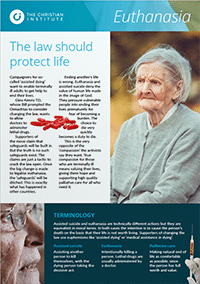An MP and campaigner for assisted suicide believes support for assisted suicide is growing among his parliamentary colleagues, and that those in favour are “getting towards a majority”.
Former Home Office Minister Kit Malthouse, who chairs the All-Party Parliamentary Group on choice at the end of life, says he has been “working the tea rooms” in trying to boost support for a change in the law, and claims “the sentiment in parliament has moved significantly since 2015”.
In 2015, MPs voted by 330 to 118 to protect vulnerable people by maintaining current end-of-life safeguards.
Starmer supportive
The remarks were prompted by news that former TV presenter Esther Rantzen has said she will travel to Switzerland to end her life at the Dignitas clinic if her cancer treatment is unsuccessful.
When asked for his opinion, Sir Keir Starmer publicly gave his support for assisted suicide, saying: “I personally do think there are grounds for changing the law”.
However, he indicated he would not make it Labour policy, admitting there are “strong views both ways on this, which I respect”.
‘Dangerous, hopeless message’
The Christian Institute’s Ciarán Kelly called the comments “a stark reminder that campaigners intent on axing end of life protections for the frail and elderly are not resting on their laurels, and neither can we”.
a stark reminder that campaigners intent on axing end of life protections for the frail and elderly are not resting on their laurels
“The 2015 vote was a great day. We give thanks to God for it. But we cannot assume it will be repeated.
“We will continue to remind people that introducing assisted suicide would send the dangerous, hopeless message that some lives are not worth living. Instead of recognising their value, vulnerable people would be made to feel a burden.”
‘Out of control’
Alistair Thompson of Care Not Killing warned Sir Keir that “There are many within his own party who are firmly opposed to changing the law because they recognise the massive dangers of going down this route.
“We only have to look at Canada where a law – that was introduced to help the terminally ill, mentally competent people with less than six months to live have their life ended – has spun out of control.”
He said that while activists claim that assisted suicide is “quick and painless”, evidence from other countries where it takes place shows this is not the case, and that “rather than discussing again this dangerous and ideological policy”, politicians and campaigners should focus on improving NHS services and palliative care.
‘Issue of conscience’
In response to the public debate, a spokesperson for the Prime Minister said: “The position of the government has not changed. It is a matter for parliament to decide. It’s an issue of conscience for individual parliamentarians.
“MPs, I believe, last had the opportunity to vote in 2015, when they rejected making any change in the law. It will be for parliament to decide on any future debate.”
In a debate in Westminster Hall last year, many MPs spoke out against changing the law. They were responding to a petition calling for the law to be changed to allow doctors to help patients deemed to be terminally ill kill themselves.
While a number of MPs supported removing safeguards, others objected, highlighting how the current law protects vulnerable people.
2022 debate (Westminster Hall):
2015 debate before vote in House of Commons:
Church leaders: ‘RoI must not undermine sanctity of life by legalising assisted suicide’
Psychiatrist: ‘Canada must stop the runaway train of euthanasia expansion’
Majority of UK doctors would not facilitate assisted suicide
Canadian mother with stage four cancer pushed to consider euthanasia



